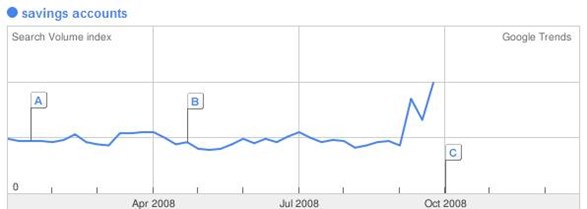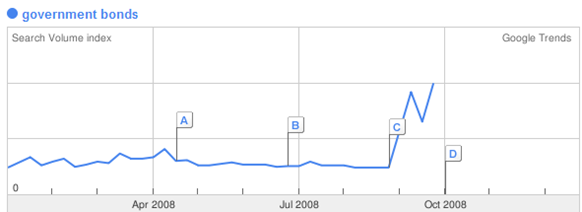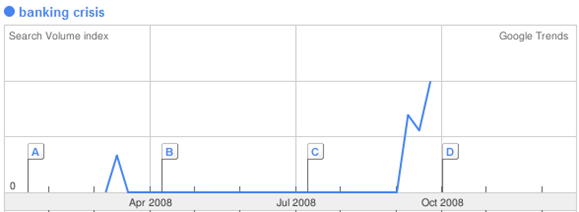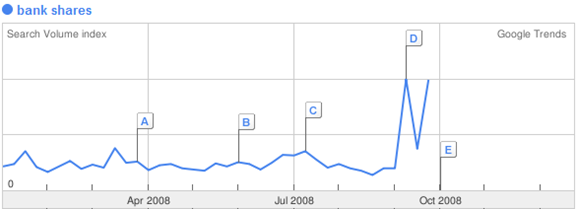In Mandarin the word 'crisis' is composed of two characters; one represents danger, the other opportunity. It's these polarised realities that should form the backbone of any strategy for dealing with the whole gamut of possible calamities that could befall your business. The immediacy of search marketing makes search engines the perfect medium to alleviate the danger and exploit the opportunity.
Alleviating the danger
Neutralise
During a crisis, whether it's systemic (like the current banking crisis) or specific to your brand or products (such as bad press due to a dangerously defective new product), there needs to be a rapid search marketing response. The first step is to neutralise. Fix the problem if a fix is possible and within easy reach, or - at the very least - prepare a measured response that cuts to the heart of the problem. Search marketing is a highly manoeuvrable vehicle that can be exploited to deliver this neutralising strategy rapidly and measurably.
First and foremost, change your messaging in your paid search ads for certain search queries - and increase budget allocation. This will ensure you maintain your share of voice (SOV) within the context of the crisis, and the wider industry. Your share of voice is your brand's or group of brands' advertising weight, expressed as a percentage of a defined total market or market segment in a given time period. The weight is usually defined in terms of expenditure, ratings and so on.
SOV has a direct link to share of market (SOM). So the more visible you are, the more likely you are to not only deflect or smother negative sentiment but maintain - and possibly even grow - your market share in the process. Shout louder when you're pressured, rather than hiding away and expecting things to blow over. The best defence is attack, as Sun Tzu would say.
Operating a blog that has been built with SEO in mind would come in handy here too, as blogs are indexed very quickly by the search engines. A swift additional presence in the search results will help you control more of the search results pages relevant to the crisis. Essentially, it will give you the ears and eyes of the consumer, as opposed to leaving it to other websites that could be negative or defamatory about you. Building a blog in response to a crisis won't work; you need to have one in place already that can then be utilised immediately. Being prepared before the event is what Bill Gates calls having 'good business reflexes'. Everyone should take a moment to seriously consider how good theirs may be.
This approach of ensuring you have good business reflexes goes one step further. You need to occupy as much of a search engine's page 1 natural listings for your brand terms as possible, and that can extend far beyond having a blog in the mix. You should have your domestic - as well as your corporate - site in there, along with your blog, a few of your international sites and your supplier portal. This will mean when people search for your brand, product or the crisis itself using a search engine, you'll have almost complete control of the messages the consumer and potential consumer sees. At the same time, you'll be pushing sites that exist to discredit you down into page 2, which people rarely venture into especially when searching for brands.
Essentially, this neutralisation is essentially about increasing your SOV within the context of the crisis as quickly as possible. This kind of increase can only be triggered through spending more money or spending it more effectively. So you should expect to have to pay your way out of the crisis or move money around to get more bang from your buck. Again, search marketing is key here as there really isn't a bigger bang for your buck. Move money from other activities if need be; just make sure your search marketing is firing on all cylinders. Effectively, you're on a charm offensive to alleviate concern and stabilise consumer sentiment, and you need to allocate resources to achieve that.
Manipulate
The second stage is to manipulate consumer sentiment by engaging with other websites to help you alleviate the crisis. This is like increasing your SOV without the advertising spend component. You can do this by ensuring (preferably before the event) that you have a good understanding of who in the online space contributes to how your brand or product is perceived. For example, Moneysavingexpert.com has a huge impact on how finance brands and products are seen by consumers, given that it's seen as being trustworthy and impartial. Reputations and new products are routinely made and destroyed in these quarters.
Methods of analysing who has this influence are offered by many agencies, including many search agencies. These will scientifically identify where your existing and potential customers go to get the information that directly influences their buying decisions, as well as interpretations of events you may have caused or that are affecting you. Influencing these influencers through traditional PR methods may not be enough. You should also allocate banner advertising budget to those sites with highly focused messaging that cuts to the heart of the crisis and your position within it. There is plenty of research that shows display and search advertising undertaken together makes both activities more effective. And a crisis is obviously a good time to try and exploit these synergistic relationships between your media channels.
Monitor
The third stage is ensuring you monitor your competitors. After all, they may be exploiting your crisis for their own ends. Review and analyse their messaging to make sure they aren't trying to stoke the flames of your misfortune or negligence. In search marketing this happens predominantly within paid search, with competitors sometimes bidding against each others' brand or generic search terms with messages that are designed to discredit or attract consumers away from them. Investing in some monitoring services, such as Greenlight's Search Sentry platform, will ensure that you spot these occurrences immediately, at which point you can respond. You could do this through your own creatives, or by taking legal action, responding in kind or contacting the aggressive competitor and compelling them to crease this activity.
Exploiting the opportunity
Exploiting a competitor's crisis for your own ends is an obvious option here. Of course, it's a question of ethics so I'll restrict my comments to simply saying search marketing is exceptionally effective at kicking a person when they're down. Do with this what you will.
In less ethically murky terrain, you could harness a number of methods of finding and exploiting opportunities within a crisis.
Consumer search behaviour can move quite dramatically during a macro crisis. The Google Trends graphs below illustrate the increase in UK searchers looking for savings advice, savings options, and general crisis-related search phrases during our current financial woes:




Engage
There is a clear opportunity to engage the potential or existing consumer or journalist in a direct way. Searchers are indirectly communicating their fears and desires by virtue of the search phrase they are using. So you can then immediately respond through paid search and position yourself as the saviour, sage or sympathiser. If people are searching for a product you offer that has just been found to be faulty or for 'banking crisis', it gives you a right to reply, on your own terms. Furthermore, your competitors are likely to have missed this move in consumer search behaviour, which means that you'll have the searchers' relatively undivided attention. This lack of competition for these terms increases your share of voice cost-effectively.
Exploit
The second step is to exploit the crisis. If the crisis is systemic (a recession for example) you should launch a proactive marketing campaign at a time when your competitors may be holding back budgets or pausing activities. Invest in SEO and PPC so that when the crisis ends - and the market expands again - you'll reap the rewards of the greater market share you picked up when your competitors were inert and losing market share.
If the crisis isn't systemic use the negative attention positively. For example, if your product was defective, show your consumers you responded rapidly to their concerns and sorted things out, thereby instilling loyalty and faith. People know bad stuff happens to most companies sometimes, and they can forgive them that. But they're less forgiving if you screw up, ignore them and don't fix the problem quickly and politely.
Learn
The final step is to learn from the crisis. It may sound clichéd, but pressure does indeed make diamonds. Crises can be opportunities to identify weaknesses and inefficiencies in your business processes, people and position in the market place. How you respond to a crisis also defines the kind of company you are and the kind of company you want to be. It's an example you set your people that becomes part of the DNA of your corporate culture.
Learning is easy - and search marketing is a fantastically measurable medium. You can gain an understanding of how successful you've been. You can identify how many people saw your paid search ad and visited your blog through natural search, as well as how they searched, what specifically concerns them (by identifying their search term usage) and what their actions were beyond that point.

